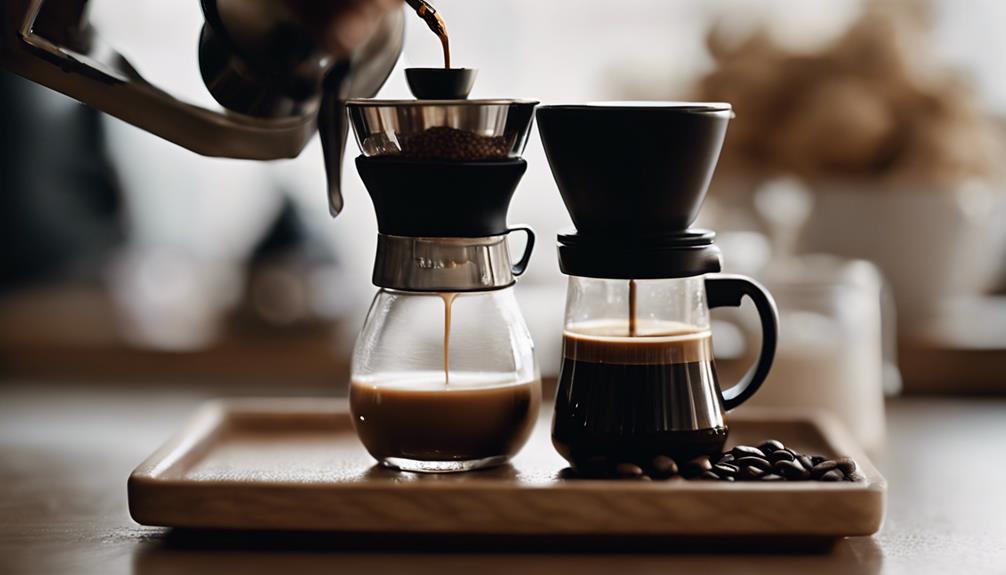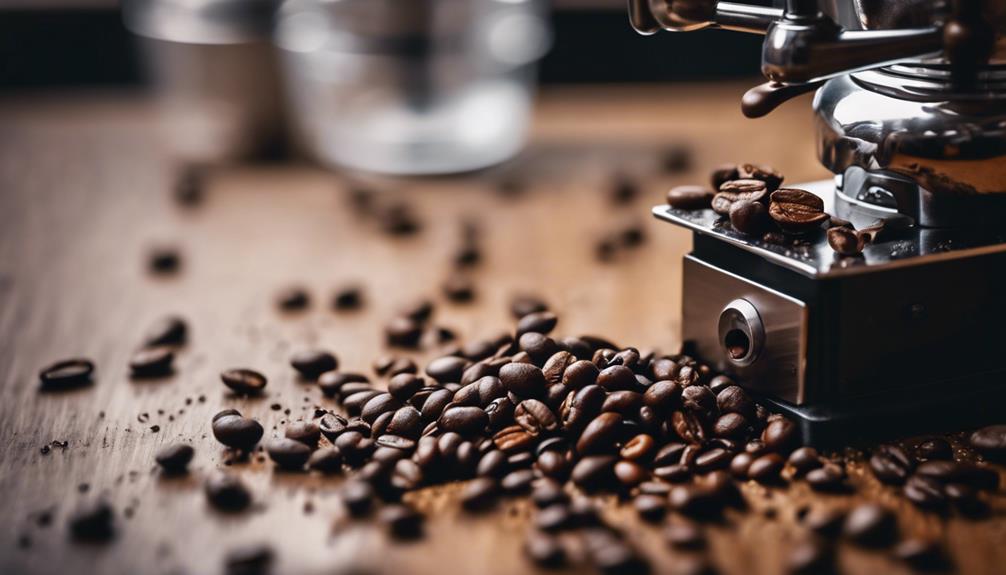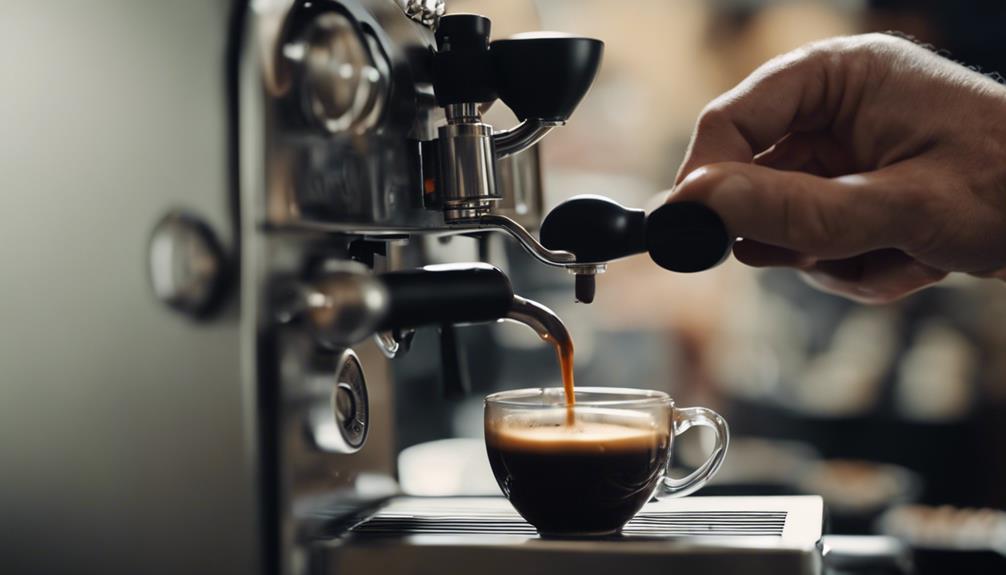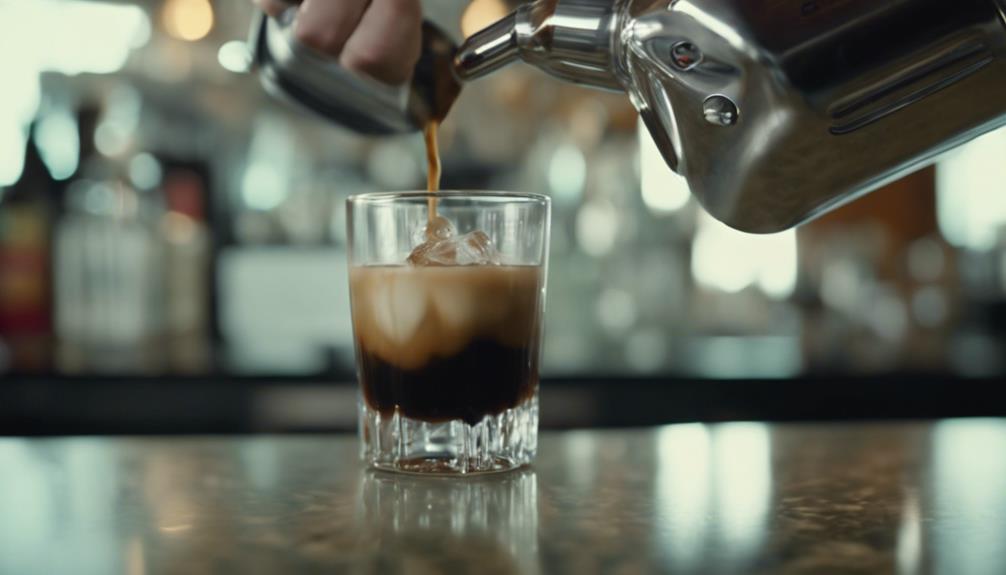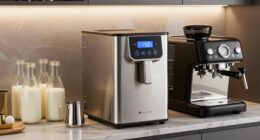When comparing espresso and black coffee, it is important to note the key differences between the two. Espresso, which is made under high pressure, produces a strong shot with a characteristic crema, typically served in 1-2 oz portions. On the other hand, black coffee brewed from drip brewers or French press allows for a customizable strength in 6-8 oz servings. The brewing methods used greatly influence the taste intensity of each type of coffee. Espresso is known for its bold, bitter flavors and robust aroma, while black coffee offers milder nuances and a variety of bitterness levels. In terms of caffeine content, espresso contains less per shot but is more concentrated, whereas black coffee has a higher caffeine content per cup and is also rich in antioxidants. Take a deeper dive to uncover the unique characteristics of each type of brew.
Key Takeaways
- Espresso is a concentrated shot served in 1-2 oz portions, while black coffee is brewed in 6-8 oz servings.
- Espresso has a bold, bitter flavor and intense aroma, while black coffee offers milder, varied flavors and aromas.
- Espresso has higher caffeine concentration per ounce, while black coffee contains more caffeine per cup and antioxidants.
- Different brewing methods impact taste and intensity, with espresso providing bold flavors and black coffee offering customizable strength.
- Espresso-based drinks like macchiatos and lattes are bold, while black coffee variations like Americanos and pour-overs offer a range of flavors.
Brewing Methods
When comparing espresso and black coffee, the brewing methods play a crucial role in determining the final taste and intensity of each type of coffee. Espresso, brewed under high pressure using espresso machines, undergoes intense extraction, resulting in a concentrated shot with a layer of crema on top.
On the other hand, black coffee, made with drip brewers, pour-over methods, or French press, allows for a more customizable strength and nuanced flavor profile.
Espresso's brewing process emphasizes speed and intensity, extracting bold flavors from finely-ground coffee beans. In contrast, black coffee brewing methods offer the flexibility to adjust the strength and flavor according to personal preference.
Whether you prefer the quick jolt of a potent espresso shot or the leisurely experience of savoring a milder black coffee, understanding how the brewing methods influence the taste and intensity of your cup is essential.
Flavor Profiles
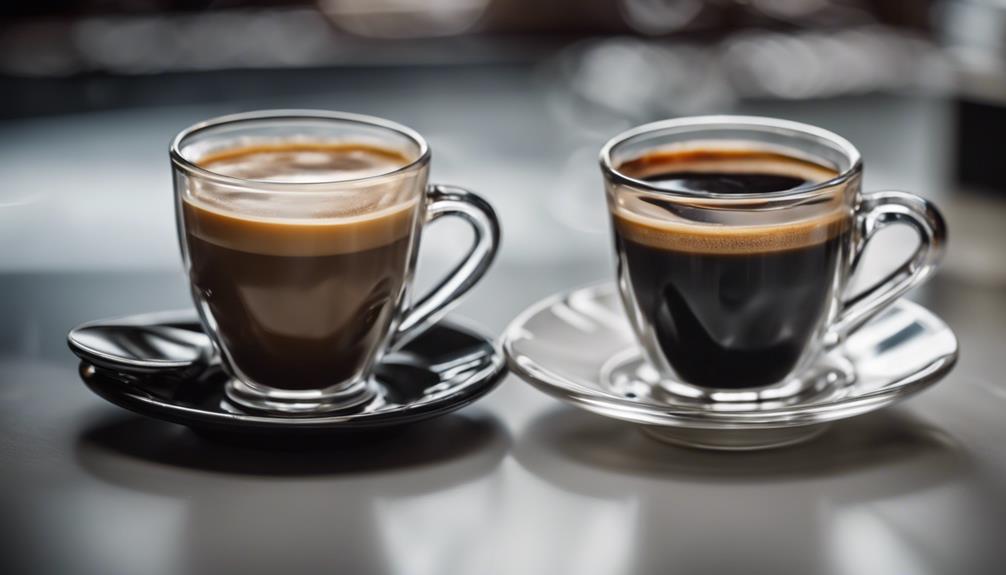
Espresso and black coffee offer distinct flavor profiles that cater to different taste preferences. Espresso boasts bold, concentrated flavors with a creamy texture and a touch of bitterness, enhanced by its high-pressure brewing process.
In contrast, black coffee tends to have milder, more subtle flavors, allowing for a variety of taste notes to shine through.
Aroma Differences
The aroma differences between espresso and black coffee play a crucial role in defining their distinct flavor profiles.
Espresso is known for its intense and concentrated flavors, characterized as rich, bold, and slightly bitter. This is mirrored in its deep and robust aroma, which is a result of the high-pressure extraction process and the presence of crema.
On the other hand, black coffee offers a milder taste with more subtle and diverse flavor profiles. Its aroma is lighter and more varied, influenced by factors such as bean origin, roast level, and brewing method.
These distinct aroma disparities contribute significantly to the unique flavor experiences of espresso and black coffee.
While espresso boasts an intense and concentrated aroma that matches its bold flavors, black coffee presents a more nuanced and varied scent that complements its milder taste and subtle flavor notes.
Brewing Methods
Brewing methods greatly influence the distinct flavor profiles of espresso and black coffee. Espresso, brewed under high pressure for a short time, delivers a bold and intense taste, often topped with a layer of crema. The fast extraction process using finely-ground beans results in concentrated flavors that are synonymous with espresso.
On the other hand, black coffee, typically made using drip methods, offers a milder taste with more volume and subtle nuances compared to espresso. The flavor clarity in black coffee is influenced by factors like grind size, water temperature, and brewing time.
Espresso machines, with their high-pressure extraction, accentuate deep coffee flavors rapidly, creating a robust taste experience. Conversely, drip brewers such as pour-over methods provide control over the flavor profile of black coffee, allowing for a more nuanced and varied taste with subtle undertones.
In essence, the brewing methods for both espresso and black coffee play a pivotal role in shaping their distinctive flavor profiles.
Taste Notes
Interested in exploring the distinct taste notes of espresso and black coffee?
Espresso is renowned for its bold and intense flavors, boasting a robust profile with rich, creamy textures and a slightly bitter undertone. The high-pressure brewing process in espresso machines extracts deep coffee aromas, resulting in a concentrated and potent drink.
On the other hand, black coffee offers a more subtle and varied flavor experience. Influenced by factors like bean type, grind size, and brewing duration, black coffee can present a wide range of flavors from acidic and bright to smooth and mellow. The medium-ground beans used in black coffee, along with the drip brewing method and the use of filters, contribute to its lighter and more expansive taste compared to espresso.
While espresso delivers a quick and intense flavor punch, black coffee provides a nuanced and prolonged tasting journey with its diverse flavor palette.
Caffeine Content
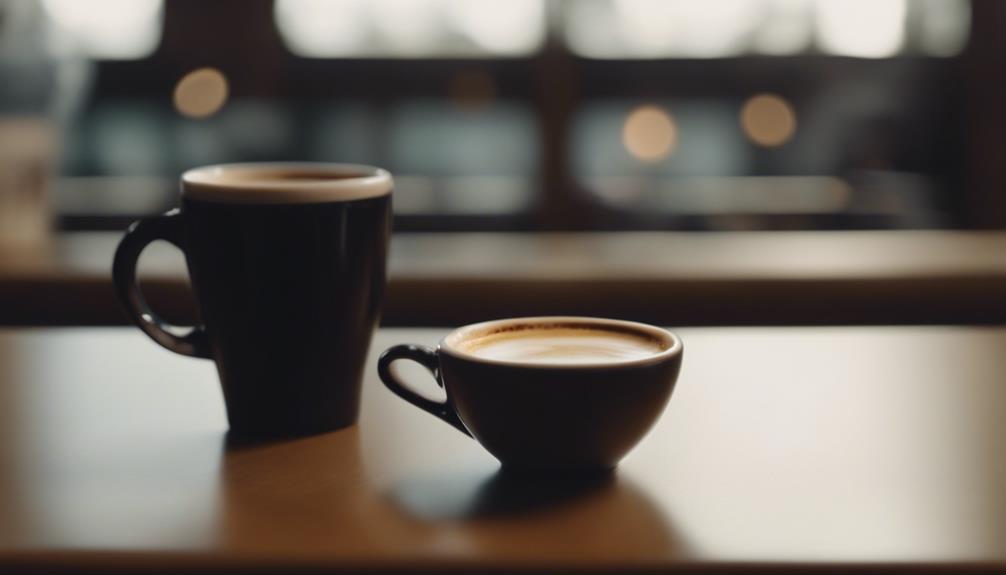
Espresso and black coffee differ in their caffeine content. While a shot of espresso has less caffeine than a cup of black coffee, the higher concentration in espresso may give the impression of a stronger kick.
Various factors, such as brewing methods and bean types, can influence the caffeine levels in your cup of joe.
Caffeine Concentration
Comparing the caffeine concentration between espresso and black coffee reveals distinct differences in their potency per ounce. Espresso typically contains 30-50 mg of caffeine per 1 oz shot, while black coffee has 80-120 mg per 8 oz cup. Despite having less caffeine per serving, espresso boasts a higher caffeine concentration per ounce compared to black coffee. This intensified concentration is due to the smaller serving size of espresso, contributing to its perceived strength regarding caffeine content.
When it comes to black coffee, the caffeine content can vary based on factors like brewing method and bean type. Understanding the caffeine content of espresso and black coffee is essential for choosing the right option based on your personal preferences and caffeine needs.
Whether you prefer the quick, intense kick of espresso or the larger, longer-lasting caffeine boost from black coffee, being aware of their caffeine concentrations can help tailor your coffee choice to suit your individual requirements.
Brewing Methods
When brewing espresso and black coffee, the caffeine content can vary greatly based on the specific brewing methods employed. Espresso is made by forcing hot water under pressure through finely-ground coffee beans, resulting in a concentrated and bold flavor. A single shot of espresso contains about 63 mg of caffeine per ounce, making it more potent than black coffee.
On the other hand, regular coffee, brewed using methods like drip coffee in an auto-drip machine, involves pouring hot water over the grounds and allowing it to filter through. Black coffee typically contains 80-185 mg of caffeine per 8 oz cup, with around 12 mg per ounce.
Understanding this difference can help you choose between the intense kick of espresso or the milder caffeine dose in black coffee. Whether you prefer a quick caffeine boost from a shot of espresso or a more gradual effect from a cup of black coffee, both options cater to various preferences and needs.
Serving Size
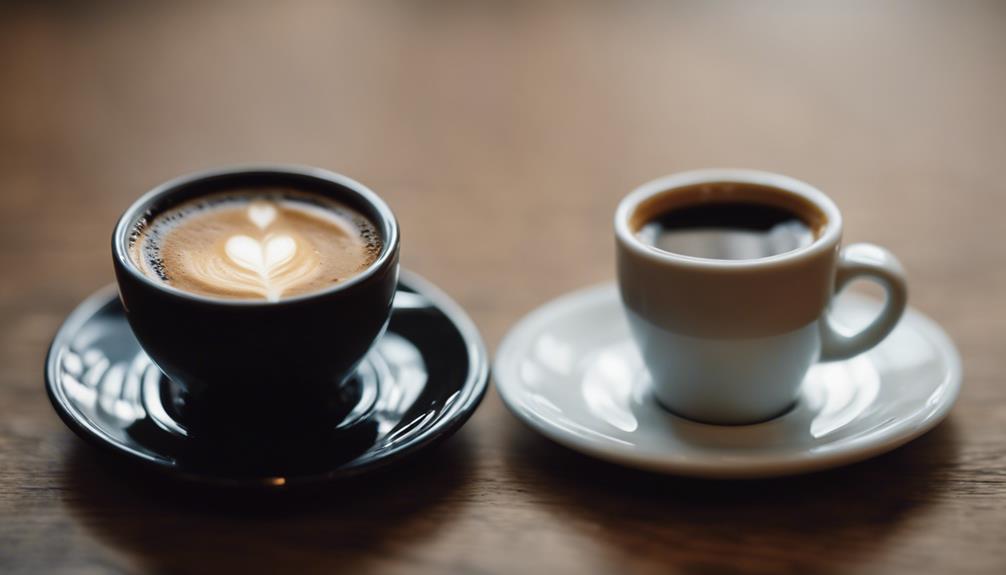
The serving size difference impacts your coffee-drinking experience by concentrating flavors and caffeine in espresso shots and allowing for a more extended enjoyment with black coffee. Espresso is typically served in small 1-2 oz shots, intensifying the taste and kick of the brew in a compact volume. This concentrated form of coffee is designed to be consumed quickly, delivering a potent burst of flavor and energy.
On the other hand, black coffee comes in larger portions, ranging from 6-8 oz, providing a longer-lasting drinking experience. The increased volume allows for a more gradual enjoyment of the brew, savoring the flavors over an extended period. The serving size difference between espresso and black coffee notably impacts the intensity and duration of your coffee-drinking journey, catering to different preferences for a quick pick-me-up or a leisurely coffee indulgence.
Aroma and Bitterness
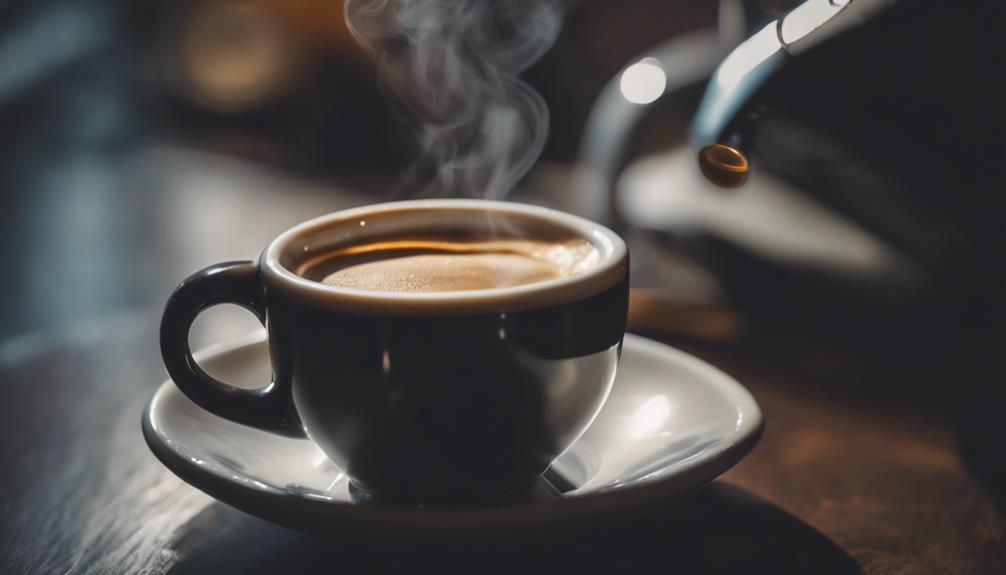
In your coffee experience, the aroma and bitterness play significant roles, distinguishing espresso from black coffee. Espresso typically boasts a more intense and robust aroma, enticing your senses with its strong coffee fragrance. On the other hand, black coffee may offer a milder aroma, often with subtle notes that reveal the nuances of the coffee beans used in the brew.
When it comes to bitterness, espresso tends to be more pronounced due to its concentrated extraction process. The high-pressure method of extracting flavors from finely-ground coffee beans results in a bold and bitter flavor profile that's characteristic of espresso.
In contrast, the bitterness in black coffee can vary depending on the brewing method and the roast of the beans used. This variation allows for a range of bitterness levels, offering coffee drinkers the opportunity to explore different flavor intensities based on their preferences.
Health Considerations
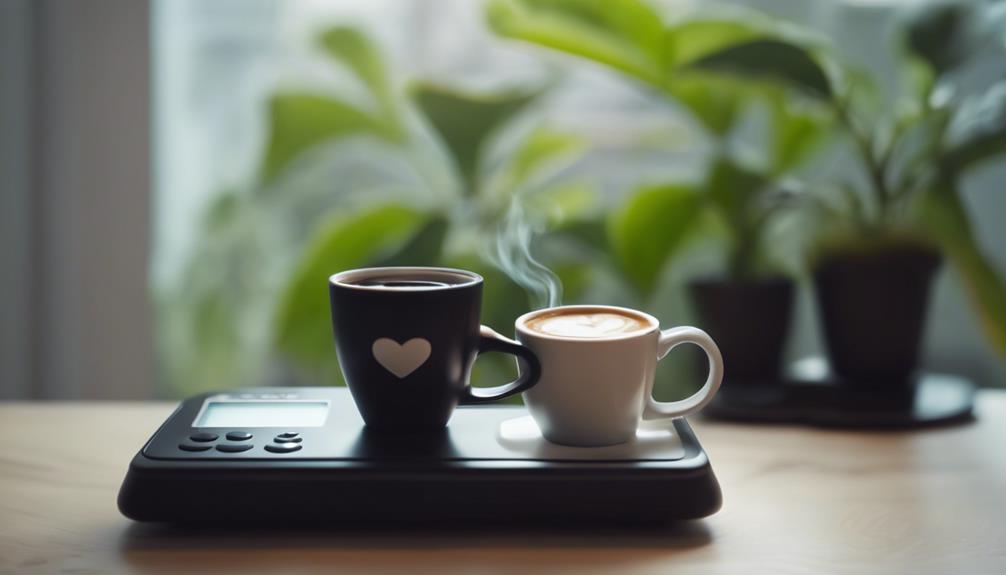
Considering health aspects, both espresso and black coffee offer unique benefits that cater to different preferences and needs. Espresso contains 30-50 mg of caffeine per typical 1 oz shot, whereas black coffee can deliver 80-120 mg in an 8 oz cup, making it a stronger energy booster.
Black coffee boasts higher antioxidant content due to the brewing process, potentially aiding in protecting against diseases. Espresso, being a concentrated form of coffee, may be gentler on the stomach due to its reduced volume, making it a good choice for those with sensitive stomachs.
If you're looking to reduce sugar and calorie intake, black coffee is often preferred over espresso-based drinks, which can be laden with sugars and fats. Both espresso and black coffee offer health benefits like improved focus, alertness, and potential protection against certain diseases, making them excellent choices for your daily brew.
Types of Espresso and Black Coffee Drinks
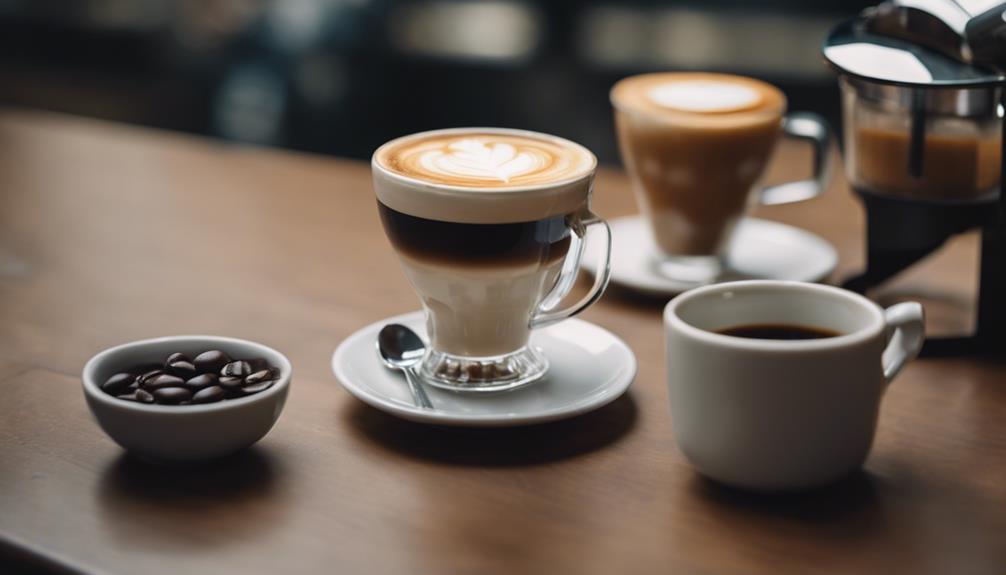
Let's explore the diverse array of espresso and black coffee drinks that cater to varying taste preferences and flavor profiles.
When it comes to espresso, you have a range of options such as macchiato, cappuccino, and latte, each offering unique milk and foam ratios. The brewing method for espresso involves a high-pressure extraction process that results in a concentrated shot of coffee with a bold flavor profile.
On the other hand, black coffee variations like Americano, cold brew, pour-over, and French press offer different brewing techniques that highlight distinct flavors.
Espresso-based drinks like mochas and affogatos combine espresso with chocolate or ice cream for a luxurious treat, while black coffee can be enhanced with flavors like vanilla, caramel, or hazelnut syrup for a personalized touch.
Additionally, espresso shots can serve as a base for creative coffee cocktails like espresso martinis or coffee old fashioneds, showcasing the versatility and differences between various types of espresso and black coffee beverages.
Frequently Asked Questions
How Is Espresso Different From Black Coffee?
Espresso differs from black coffee in its brewing method and flavor profile. It's a concentrated coffee made by forcing hot water through finely-ground beans under high pressure. This results in a bold, intense flavor with a layer of crema on top.
In contrast, black coffee is brewed by slowly passing hot water through medium-ground coffee, offering subtler and varied flavors influenced by factors like beans, grind, and water temperature.
Is Espresso Just Strong Black Coffee?
Espresso isn't just strong black coffee; it's a concentrated form made by forcing hot water through finely-ground beans under high pressure. This process results in a rich, intense flavor with a layer of crema, unlike regular black coffee.
Espresso has a higher caffeine concentration due to its smaller serving size. While espresso requires an espresso machine, black coffee can be brewed using various methods.
The taste, texture, and brewing techniques of each provide unique experiences.
What's Healthier, Black Coffee or Espresso?
When comparing the health benefits of black coffee and espresso, black coffee may be the better choice in terms of healthiness. It's lower in calories and fat, making it a healthier option for weight management.
Espresso, on the other hand, contains higher caffeine levels per ounce, providing a quick energy boost. Both can be part of a balanced diet, contributing to overall well-being when consumed in moderation.
What Is Stronger, Double Espresso or Black Coffee?
Double espresso is stronger than black coffee. It packs 60-100 mg of caffeine in a 2 oz serving, while an 8 oz cup of black coffee contains 80-185 mg.
The high-pressure extraction process and short brewing time give double espresso a bold flavor profile. Black coffee, milder in taste, uses a 1:18 grounds to water ratio.
The smaller 1-2 oz double espresso servings provide a quick and potent caffeine kick.
What are the differences between the color and taste of espresso and black coffee?
Espresso is well-known for its defined hue of espresso, which is typically a dark, rich brown color. In terms of taste, espresso is much more concentrated and intense compared to black coffee. Black coffee tends to have a lighter color and a less bold flavor compared to the robust taste of espresso.
What is the Difference in Taste Between Espresso and Black Coffee Made with Medium Roast Coffee?
Espresso, made with finely ground coffee beans and hot water under pressure, has a bold, intense flavor with a rich, crema top. Black coffee, when you use medium roast coffee, has a milder taste with more nuanced flavors. The medium roast brings out a balanced acidity and a smooth, lingering finish.
Conclusion
To sum up, espresso and black coffee offer unique brewing methods, flavor profiles, and caffeine content.
Remember the old saying, 'The proof is in the pudding' – try both to see which one suits your taste buds best.
Whether you prefer the intense aroma and rich bitterness of espresso or the straightforward simplicity of black coffee, both options provide a satisfying caffeine boost.
Keep in mind the serving size and health considerations when enjoying your favorite coffee drink.
Choose wisely, and savor every sip!
